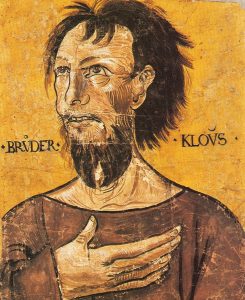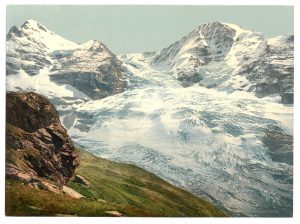Peter writes: Last week my middle son turned 50 – a sobering thought, and I wonder what the world will be like by the time his children turn 50. His birthday falls on the feastday of St Nicholaus von Flüe. Commonly known as Bruder Klaus, he lived in the mid 1400s and is the patron saint of Switzerland. He grew up in an alpine village roughly halfway between Lucern and Interlaken. In his younger days, he was a man on the way up, holding various senior positions in political life. He was known for his integrity as well as for his deep faith and could have gone on to become a great national leader.
Looking at today’s readings, Habakkuk 1.1-4, 2.1-4; 2 Timothy 1.1-14; Luke 17.5-10, I was struck by how appropriate they are for the theme of vocation. We have that very much in mind, as Rachel takes the next step in her vocation and ministry this afternoon. Vocation does have its joys, as I can readily testify, but also its hardships, as the letter to Timothy reveals. And, equally, we can see from our readings that all Christians have a vocation and that often means giving up or doing without some of the things that others would consider desirable or essential.

Bruder Klaus’ early political career offered prospects of high status and a life of ease, but he gave it all up to follow a different vocation. He returned to his village, living the simpler – some would say limited – life as a hermit. It wasn’t long before people started to come to him in droves to ask for his prayers and for advice on political and legal matters. Once his mediation even prevented a war between the cantons. I suppose this was what we now call soft power. His hermitage and chapel still stand, in a wonderful spot down a steep valley slope from the village and to celebrate the Eucharist there was a deeply moving experience for me.
Thinking about his life led me to wonder about our vocation as Christians in this Season of Creation. When you visit Bruder Klaus’ village today, you will see how the alpine glaciers are disappearing. These glaciers form an enormous natural reservoir, supplying all the major rivers of Europe. Their disappearance will have a devastating effect on agriculture and living conditions. Floods and droughts in other parts of the world are already leading to famines, mass migrations and wars.

The Eiger Glacier (public domain)
We cannot carry on with business as usual. Already poor communities can only afford to live on flood plains and other marginal land where they are vulnerable to natural disasters. Prophets like Habakuk were fierce in condemning injustices like this. Perhaps we need to admit that some so-called natural disasters are not natural at all.
When we see the ambitious targets that are being set, the basic question is: are we willing to change our habits in order to meet them? To put it in theological terms: are we willing to repent? Last Sunday, in the letter to Timothy we read “There is a great gain in godliness combined with contentment”. There is a difference between, on the one hand contentment that comes from gratitude – “Then thank the Lord, o thank the Lord for all his love”; and on the other a contentment based on the self-satisfaction of those who have made it in the eyes of the world. The gains of godly contentment lie in the achievement of justice, of love and respect for all people and for all God’s creation.
We are beginning to make changes – taking recycling for granted or reducing single-use plastics. But do we really need to have strawberries flown in for Christmas? Are we tackling the current rise in energy prices the right way? Obviously we must help those who are plunged into poverty now but I cannot help thinking that today’s crisis should force us to act more urgently to achieve radical reduction in carbon emissions. Perhaps should some of the money already earmarked be put towards properly insulating our homes?
There are other changes we could – should – make. Animal husbandry is a very inefficient way to cater for our high-protein diets. It uses up huge amounts of land and water for grazing. Do we need to have meat on our table every day? And then, there’s transport. We all know about flying. But, if I gave up flying completely would would I never see my son in Canada again? There are hard choices to be made. Most of us still rely on our cars, but iff there was reliable and cheap public transport we could leave them at home more often.
Our vocation in this climate crisis has to be one of repentance. The word means “turning back”. Our vocation calls us to realise we have been going in the wrong direction and to act and speak accordingly. The actual issues might have been different in biblical times but the underlying causes are remarkably similar. Our response to the climate crisis is not simply a secular matter. It is there in the Bible.
For prayer and reflection
A prayer of Nicholaus von Flüe
My Lord and my God, take from me everything that distances me from you.
My Lord and my God, give me everything that brings me closer to you.
My Lord and my God, detach me from myself to give my all to you. Amen.
Loving Father, who through your Son has given us His Church as a community of faith, hope and love, keep us faithful to our vocation to do what pleases you in building your Kingdom here on earth. We pray especially for Rachel as she takes the next step in her calling today.
Creator of earth, sea, and sky, kindle the fire of your Spirit within us that we may be bold to heal and defend the earth, and pour your blessing upon all who work for the good of the planet.
Breath of life, receive our thanks for the beauty of your creation; grant us the wisdom and will to conserve it and to heal its wounds. We thank you for its wondrous diversity and we pray for its well-being.
Wise Creator, receive our gratitude for places of restoration and healing, and continue to bless those places that feed our lives and spirits. Giver of all good gifts, awaken us daily to our dependence upon your bounty, and make us always thankful for the abundance of your blessings.
(From materials for Creationtide of the Scottish Episcopal Church)






